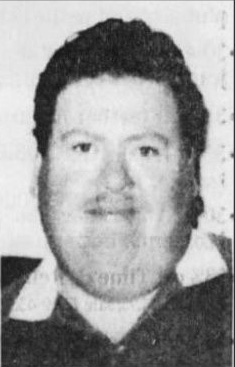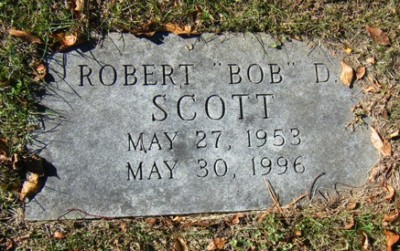
Robert Scott
Robert D. Scott
Homicide
Robert “Bob” D. Scott
43 YOA
1000 Blk, E. 12th Street
Des Moines, IA
Polk County
Police Case # 1996-22677
May 30, 1996
 Polk County in Iowa
Polk County in Iowa
 Des Moines in Polk County
Des Moines in Polk County
Robert D. Scott, a 43-year-old Des Moines cab driver, was killed on duty May 30, 1996, while driving his taxi in the 1000 block of East 12th Street.
Scott is one of thousands of taxi drivers memorialized on the Taxi-Library website’s Taxi Driver Memoriam List, and one of 10 Iowans slain. Six of Iowa’s 10 cases remain unsolved.
The full list of Iowa taxi-drivers killed on duty includes:
- William (Crip) Hamilton, killed Aug. 21, 1921, in Centerville
- Thaddeus William Mitchell, killed Dec. 7, 1922, in Des Moines (unsolved)
- George James Massouris, killed Nov. 18, 1950, in Council Bluffs (unsolved)
- Leon E. Groves, killed Dec. 22, 1951, in Des Moines (unsolved)
- Larry Allen Elliott, killed Jan. 20, 1983, in Council Bluffs
- Matthew Pusateri, killed Nov. 12, 1988, in Cedar Rapids (unsolved)
- Robert Scott, killed May 1, 1996, in Des Moines (unsolved)
- Richard Dankert, killed March 25, 2009, in Cedar Rapids
- Cathy Boyle Stickley, 54, robbed and stabbed April 29, 2011, in Cedar Rapids (unsolved)
- Ricky Ray Lillie, killed June 27, 2017 in Iowa City
About Robert “Bob” Scott
Robert Scott was born May 27, 1953.
He was laid to rest at Glenwood Cemetery in Des Moines.
 Courtesy photo Katie Lou, findagrave.com
Courtesy photo Katie Lou, findagrave.comRobert “Bob” Scott is buried in Glendale Cemetery in Des Moines.
Information Needed
If you have any information about Robert Scott’s unsolved murder please contact the Des Moines Police Department at 515-283-4864.
Sources:



 Des Moines in Polk County
Des Moines in Polk County Courtesy photo Katie Lou, findagrave.com
Courtesy photo Katie Lou, findagrave.com
He was shot twice in the head . Contact me if you need to know anything else I am his daughter!
It would be nice if the Des Moines Police could provide a bit more details on his murder. Was he shot, stabbed, strangled, beaten to death. Also, was any money missing. Robbery, might be a motive to kill someone especially a cab driver. It makes me wonder why they are holding back some information. He was murdered over 22 years ago, and not releasing some basic information, seems to not have helped.
Patrick, as the founder of Iowa Cold Cases, I give thanks to the Des Moines Police Department for taking the time to provide to me a list of their unsolved homicides, to include the names of victims, their case numbers, the address or vicinity where these individuals were killed, and the crime dates.
I’d also like to note that the DMPD has an incredible 85% homicide-clearance rate (as of the end of 2018), which is not only higher than many other Iowa cities, but well above other several other major American cities.
It’s been nearly 14 years since the ICC website launched, and there were far less digital newspaper archives available in 2005 as there are today. Murders across the state are going cold faster than we can add pages for them on ICC, and we put a priority on getting the names and basic details added to the site rather than queueing up back-logs of other names that equally deserve to be noted here. In between adding new cold cases there are tips to forward to the respective investigating agencies, numerous inquiries awaiting responses via email, website comments, ICC’s Facebook page (where there are more comments and messages to review), and of course taking daily phone calls.
We are an Iowa nonprofit agency run by real human beings who also have real lives we must address.
As more and more arrests are made by agencies utilizing genetic genealogy, those case summary pages must be updated accordingly to reflect current developments and/or convictions or acquittals.
This site’s mission is to include on the website every known unsolved homicide to remind readers these cases remain unsolved and information still badly needed. We are not city- or county- or state-paid homicide detectives. But we spend thousands of hours every year trying to keep this ever-increasing list of victims’ stories up to date (including any arrests and details arising during the subsequent trials) in a state that has no official Cold Case Unit. Are we able to include every single detail of every case or answer every question posed to us? Real examples on different cases include:
All are legitimate questions, but why are they not being directed to the investigative agency instead of ICC? Who amongst us doesn’t know that LE oftentimes do not release the cause of death (or even how many stab wounds a victim sustained and where on his/her body?) because it possibly could compromise an ongoing investigation.
We have several hundred cases on this website from across the state, and though we do conduct research and interviews and update case summaries on a regular basis, we don’t have access to all documents in every city/county cold case file.
In an in-depth 2018 Washington Post series titled, “Murder with Impunity,” there are numerous sections that address different aspects of homicides such as Where Killings Go Unsolved. Another article in the series is “Buried Under Bodies” (published Sept. 13, 2018), and it explores the average homicide caseload any detective should reasonably be expected to handle over a one-year period. (Hint: “Any city that has a homicide detective handling more than five cases is kidding themselves,” according to Vernon Geberth, who wrote the textbook used by many police departments to teach homicide investigation. “Even the best detective can’t handle more than five cases,” Geberth says.)
The people who contact ICC are looking for answers they haven’t found in newspapers or press releases or in phone calls to detectives, but both Carol Kean and I juggle many separate cases per day and dig to find those answers (to include photos for victims in archives). We do it because we care about the victims and the family members left behind, but we don’t and never will have all the answers. Still, we carry on.
Jody @ ICC
Thanks, I see a need for the various Attorney Generals around the country, to establish cold case units, that would use retired and active investigators and some federal input, to take these cases. That way they could take the burden off the local agencies to work on the more pressing cases.
The idea for this came from author J.A. Jance, a mystery novel writer. One of her characters is a J.P Beaumont, who have a number of years moved from Seattle P.D., to the Special Homicide Investigation Team (SHIT), which is under the control of the Attorney General. They have statewide jurisdiction.
Here is Illinois, the reported on the unsolved murders of a number of mainly African-American women, who have been found on the West side and South side of Chicago. The Chicago Police response is their waiting for DNA, to provide some sort of investigative lead. I am of the mind set, that they should be looking for other things that might point them towards an offender. What will they do if the DNA comes from someone not in the system. They are back to square one
I agree that they do withhold certain information as in regards to cause of death. But, in many other cases the authorities have released that information. I have a problem with some of the stuff that has been withheld, especially in cases that are over 20 or more years old. That little tidbit about a ring, or watch that was missing, might have jogged someone’s memory.
I came across a cold case from Indiana, involving the murder of a man and his wife, on Websleuths. I don’t know all the details, but one of the main contributor appears to be someone from their family. It appears when in days of their murder a relative is cleaning out the house. Also, that included a safe containing numerous firearms. When complained to the police about it, they were told its a civil matter. Wait a minute could one of those weapons have been used to murder them. There are hints that the relative was a female who had a serious drug problem.
I also point to Todd Matthews, a spokesman for NamUs, to was the guy who spent years of his time trying to identify the murdered woman known as the Tent Girl.